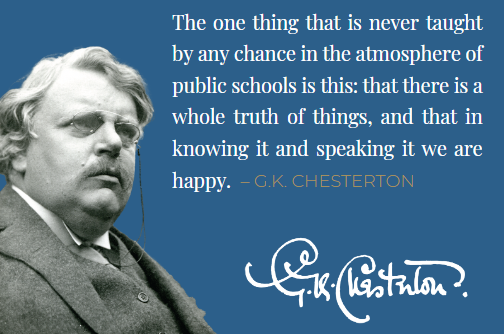Headmaster’s Perspective - Critical Thinking vs. Right Reason
When people talk about education today, a frequent claim is that students need to be taught "critical thinking." Let's endeavor, then, to think critically for a moment about critical thinking. After all, critical thinking seeks to replace the traditional teaching about "right reason." So what is the difference?
We should not be surprised that definitions of "critical thinking" vary greatly. After all, its advocates are unable to agree that thinking is by nature ordered to knowledge, and the nature of a thing cannot be known if we do not understand its purpose. Since critical thinking lacks a definite end or goal--what the ancient Greeks called a "telos"--it becomes an end in itself, as if the goal of education is merely to learn how to think but never what to think.
But what about right reason? At its most basic, right reason is an orderly and valid thought leading to knowledge. It is epitomized by philosophy or scientific inquiry. So whether we are discussing planets or poetry, we must reason rightly, that is, invoke a science proportionate to the subject matter under consideration.
Right reason is not only the habit of proceeding correctly in our scientific thinking, but it is also the habit of science itself. The expression "habit of science" refers to a virtue inhering in the intellect that consists in the very content of knowledge about a subject matter. In short, reason is right precisely so long as it both proceeds well and, in the process, attains its object, which is science or knowledge. Therefore, right reason is both perfective of the individual human subject and yields an objective content that is universally true. Critical thinking, however, is forever raising questions but never attaining certitude; it is a means devoid of an intelligible end.
So, if we think rightly about critical thinking, we should reject it in favor of right reason, which, at the Chesterton Academy of St. John the Evangelist, is the principle of unity in its integrated curriculum.
About Our Curriculum
Students at Chesterton Academy enjoy a cohesive, content-rich education. History, literature, philosophy, theology, and languages are braided together in an integrated curriculum utilizing the Socratic Method. Math and science are intimately connected; the logic of math is seen in philosophy and God’s handiwork is seen in the sciences. Equal emphasis is given to the arts, so that every student learns to draw and paint, sing in the choir, act on the stage, give speeches, and engage in debate. The result? articulate, clear-thinking, well-rounded, and, very importantly, joyful individuals.

